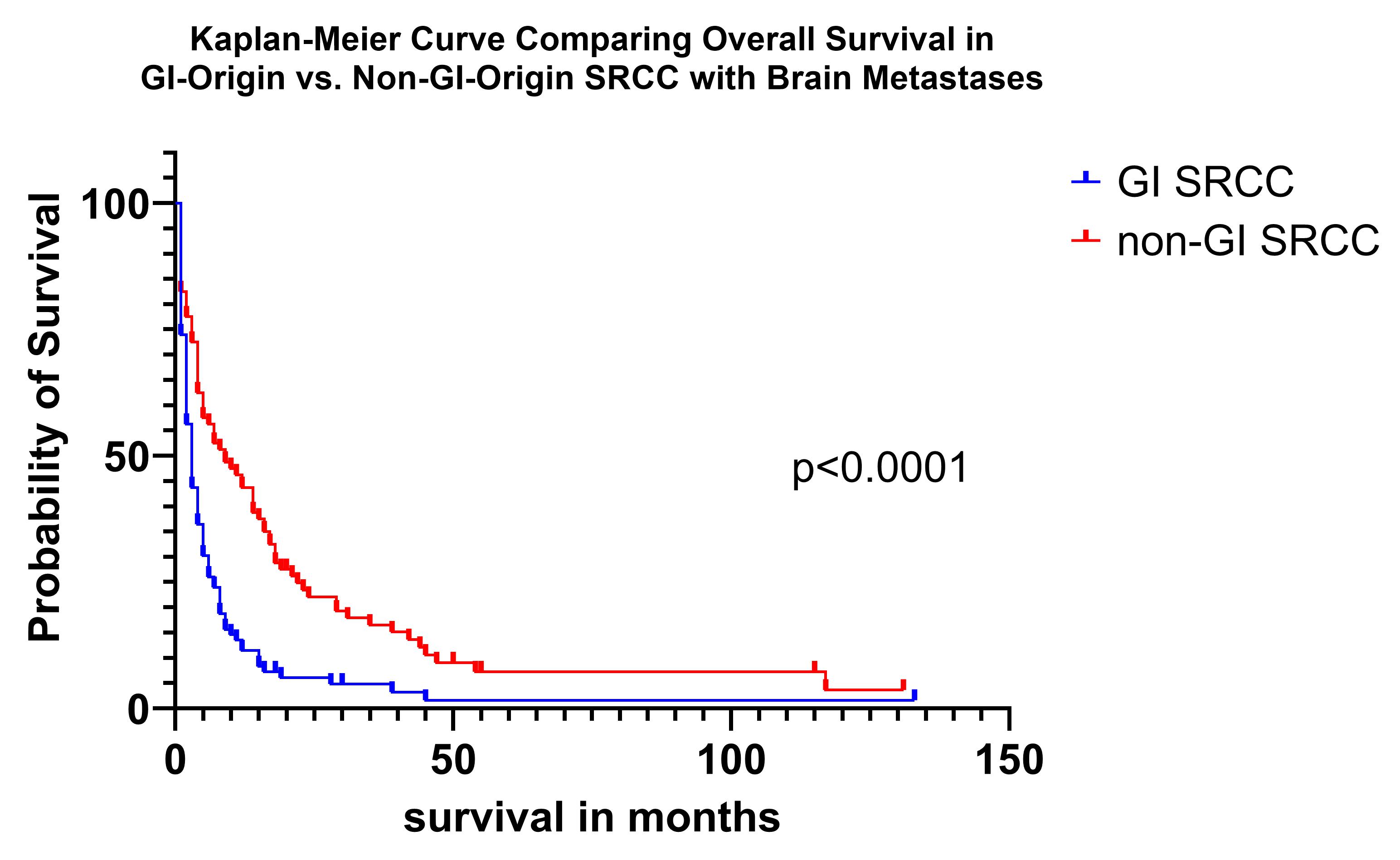Monday Poster Session
Category: Stomach and Spleen
P4167 - Survival Outcomes of Gastrointestinal versus Non-Gastrointestinal Signet Ring Cell Carcinoma With Brain Metastases: A Population-Based Retrospective Analysis
Monday, October 27, 2025
10:30 AM - 4:00 PM PDT
Location: Exhibit Hall

Abdul Khuram, DO (he/him/his)
University of Connecticut Health
Farmington, CT
Presenting Author(s)
Janani Arunachalam, MBBS1, Abdul Khuram, DO2, Brian Byrne, MD1
1University of Connecticut, Farmington, CT; 2University of Connecticut Health, Farmington, CT
Introduction: Signet ring cell carcinoma (SRCC) is a rare, aggressive adenocarcinoma subtype, typically originating from gastrointestinal (GI) sites. Among patients with colonic SRCC, ~11% present with brain metastases at diagnosis, while gastric SRCC involves the brain in ~1% of cases. SRCC has a worse prognosis compared to other adenocarcinoma subtypes, and brain metastases further foretells a dismal outcome. Treatment options include surgical resection, stereotactic radiosurgery, whole-brain radiation, and systemic therapy based on primary tumor location. However, targeted therapies are usually ineffective due to the lack of actionable mutations and the low immunogenicity of SRCC. In this study, we aimed to compare survival outcomes between patients with GI-origin SRCC and those with non-GI-origin SRCC presenting with brain metastases.
Methods: We conducted a retrospective study using the SEER Research Plus database (2010–2021) to compare survival outcomes in patients with SRCC and brain metastases, stratified by primary site (GI vs. non-GI). Patients were identified using ICD code 8490/3. Kaplan-Meier analysis was used to estimate overall survival (OS), and comparisons were made via the log-rank test using GraphPad Prism.
Results: A total of 215 patients with SRCC and brain metastases at diagnosis were identified: 122 (56.7%) GI-origin and 93 (43.3%) non-GI. The median time to treatment initiation was 19 days. The cohort was 54% male and 46% female. Among GI-origin cases, 66% originated from the stomach. Median OS for GI-origin SRCC was 3 months, compared to 9 months for non-GI (HR 1.872; 95% CI: 1.373–2.552; p < 0.0001).
Discussion: GI-origin SRCC with brain metastases is associated with significantly poorer survival than non-GI SRCC. These results underscore the aggressive biology of GI SRCC and the need for more effective systemic therapies and precision medicine approaches. Molecular profiling is recommended for all metastatic SRCC to guide therapeutic decision-making. A major limitation is the SEER database’s lack of treatment-specific data, which may influence survival interpretation. Further studies comparing treatment approaches are warranted to optimize survival outcomes in this rare but lethal malignancy.

Figure: KM curve
Disclosures:
Janani Arunachalam indicated no relevant financial relationships.
Abdul Khuram indicated no relevant financial relationships.
Brian Byrne indicated no relevant financial relationships.
Janani Arunachalam, MBBS1, Abdul Khuram, DO2, Brian Byrne, MD1. P4167 - Survival Outcomes of Gastrointestinal versus Non-Gastrointestinal Signet Ring Cell Carcinoma With Brain Metastases: A Population-Based Retrospective Analysis, ACG 2025 Annual Scientific Meeting Abstracts. Phoenix, AZ: American College of Gastroenterology.
1University of Connecticut, Farmington, CT; 2University of Connecticut Health, Farmington, CT
Introduction: Signet ring cell carcinoma (SRCC) is a rare, aggressive adenocarcinoma subtype, typically originating from gastrointestinal (GI) sites. Among patients with colonic SRCC, ~11% present with brain metastases at diagnosis, while gastric SRCC involves the brain in ~1% of cases. SRCC has a worse prognosis compared to other adenocarcinoma subtypes, and brain metastases further foretells a dismal outcome. Treatment options include surgical resection, stereotactic radiosurgery, whole-brain radiation, and systemic therapy based on primary tumor location. However, targeted therapies are usually ineffective due to the lack of actionable mutations and the low immunogenicity of SRCC. In this study, we aimed to compare survival outcomes between patients with GI-origin SRCC and those with non-GI-origin SRCC presenting with brain metastases.
Methods: We conducted a retrospective study using the SEER Research Plus database (2010–2021) to compare survival outcomes in patients with SRCC and brain metastases, stratified by primary site (GI vs. non-GI). Patients were identified using ICD code 8490/3. Kaplan-Meier analysis was used to estimate overall survival (OS), and comparisons were made via the log-rank test using GraphPad Prism.
Results: A total of 215 patients with SRCC and brain metastases at diagnosis were identified: 122 (56.7%) GI-origin and 93 (43.3%) non-GI. The median time to treatment initiation was 19 days. The cohort was 54% male and 46% female. Among GI-origin cases, 66% originated from the stomach. Median OS for GI-origin SRCC was 3 months, compared to 9 months for non-GI (HR 1.872; 95% CI: 1.373–2.552; p < 0.0001).
Discussion: GI-origin SRCC with brain metastases is associated with significantly poorer survival than non-GI SRCC. These results underscore the aggressive biology of GI SRCC and the need for more effective systemic therapies and precision medicine approaches. Molecular profiling is recommended for all metastatic SRCC to guide therapeutic decision-making. A major limitation is the SEER database’s lack of treatment-specific data, which may influence survival interpretation. Further studies comparing treatment approaches are warranted to optimize survival outcomes in this rare but lethal malignancy.

Figure: KM curve
Disclosures:
Janani Arunachalam indicated no relevant financial relationships.
Abdul Khuram indicated no relevant financial relationships.
Brian Byrne indicated no relevant financial relationships.
Janani Arunachalam, MBBS1, Abdul Khuram, DO2, Brian Byrne, MD1. P4167 - Survival Outcomes of Gastrointestinal versus Non-Gastrointestinal Signet Ring Cell Carcinoma With Brain Metastases: A Population-Based Retrospective Analysis, ACG 2025 Annual Scientific Meeting Abstracts. Phoenix, AZ: American College of Gastroenterology.
